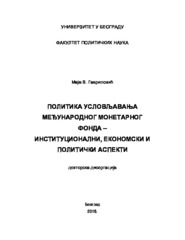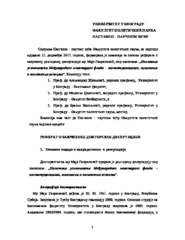Приказ основних података о дисертацији
Политика условљавања Међународног монетарног фонда - институционални, економски и политички аспекти
Conditionality of International Monetary Fund - institutional, economic and political aspects
| dc.contributor.advisor | Vasiljević, Branko | |
| dc.contributor.other | Živković, Aleksandar | |
| dc.contributor.other | Dželetović, Milenko | |
| dc.creator | Gavrilović, Maja V. | |
| dc.date.accessioned | 2018-09-20T09:53:38Z | |
| dc.date.available | 2018-09-20T09:53:38Z | |
| dc.date.available | 2020-07-03T09:39:42Z | |
| dc.date.issued | 2018-06-25 | |
| dc.identifier.uri | https://nardus.mpn.gov.rs/handle/123456789/9875 | |
| dc.identifier.uri | http://eteze.bg.ac.rs/application/showtheses?thesesId=6001 | |
| dc.identifier.uri | https://fedorabg.bg.ac.rs/fedora/get/o:18256/bdef:Content/download | |
| dc.identifier.uri | http://vbs.rs/scripts/cobiss?command=DISPLAY&base=70036&RID=50428943 | |
| dc.description.abstract | Политика условљавања Међународног монетарног фонда представља један од најконтроверзнијих аспеката рада Међународног монетарног фонда и најчешће расправљаних питања у раду ове међународне финансијске институције. Док поједини аутори у потпуности оправдавају политику условљавања сматрајући је нужном и оправданом због постојања опасност да ће доћи до „расипања“ и ненаменског трошења позајмљених средстава, други постављају критике инвазивности и наметљивости коју поседују постављени услови. Ипак, оно око чега се води највећи део расправа је њена ефикасност. Предмет истраживања ове докторске дисертације је анализа политике условљавања Међународног монетарног фонда, путем дефинисања фактора који утичу на њено обликовање, описивања околности које су довеле до њеног настанка и промена током времена, као и указивања на ефикасност политике условљавања и импликација које је она имала на земље чланице. Услови Међународног монетарног фонда (и макроекономски и структурни) су током постојања ове институције еволуирали од захтева за трајним отклањањем дефицита платног биланса, укидањем девизних рестрикција и увођењем конвертибилности, до наметања свеобухватне приватизације, потпуне економске либерализације и дерегулације, као универзалног модела за решавање платнобилансних, спољнотрговинских и свих других макроекономских проблема земаља-чланица, а све у циљу стимулисање њиховог економског раста и смањења сиромаштва (путем повећања запослености, праведније расподеле дохотка, развоја и флексибиности тржишта, стимулацију финансијског посредовања и сл). Међународни монетарни фонд је прилагођавао инструменте кредитирања и политику условљавања критикама које су долазиле како из академских кругова тако и под притиском социјалних протеста, али и глобалних макроекономских и финансијских околности. Светска финансијска криза, која је избила 2007. године, изнова је позиционирала Међународни монетарни фонд као незаобилазни фактор у решавању кризе ликвидности и солвентности држава чланица. | sr |
| dc.description.abstract | Conditionality of the International Monetary Fund is one of the most controversial aspects of the work of the International Monetary Fund and the most frequently discussed issues this international financial institution’s work. While some authors fully support conditionality, and consider it necessary and justified due to the risk of "wasting" and unintentional spending of borrowed funds, others are criticizing it because of its invasiveness and intrusiveness of the conditions. However, the one of the most discussed topics is its effectiveness. The subject of the research of this doctoral dissertation is the analysis of the policy of conditionality of the International Monetary Fund, by defining the factors that influence its formulation, describing the circumstances that led to its creation and changes over time, as well as pointing to the effectiveness of the conditionality policy and the implications it had on Member States. The conditions of the International Monetary Fund (both macroeconomic and structural) evolved from the requirement for permanent removal of the balance of payments deficit, the abolition of foreign currency restrictions and the introduction of full convertibility, to the imposition of a comprehensive privatization, complete economic liberalization and deregulation, as a universal model for solving balance of payments, foreign trade and all other macroeconomic problems of Member States, with the aim of stimulating their economic growth and poverty reduction (by increasing more equitable distribution of income, development and flexibility of the market, stimulation of financial mediation, etc.). The International Monetary Fund has adapted lending instruments and conditionality as a result of criticisms coming both from academic circles and under the pressure of social protests, as well as changes in global macroeconomic and financial circumstances. The global financial crisis, which broke out in 2007, has again positioned the International Monetary Fund as an indispensable factor in resolving the liquidity and solvency crisis of the Member States. However, the results do not indicate to the unique conclusions - while on the one hand we have had successful examples of the International Monetary Fund programs on the other there were catastrophic failures, among which Greece will most certainly be listed as the biggest one for some time. | en |
| dc.format | application/pdf | |
| dc.language | sr | |
| dc.publisher | Универзитет у Београду, Факултет политичких наука | sr |
| dc.rights | openAccess | en |
| dc.rights.uri | https://creativecommons.org/licenses/by-nc-nd/4.0/ | |
| dc.source | Универзитет у Београду | sr |
| dc.subject | Међународни монетарни фонд | sr |
| dc.subject | International Monetary Fund | en |
| dc.subject | conditionality | en |
| dc.subject | balance of payments | en |
| dc.subject | structural conditional | en |
| dc.subject | performance criteria | en |
| dc.subject | политика условљавања | sr |
| dc.subject | платни биланс | sr |
| dc.subject | структурни услови | sr |
| dc.subject | критеријуми извршења | sr |
| dc.title | Политика условљавања Међународног монетарног фонда - институционални, економски и политички аспекти | sr |
| dc.title.alternative | Conditionality of International Monetary Fund - institutional, economic and political aspects | en |
| dc.type | doctoralThesis | en |
| dc.rights.license | BY-NC-ND | |
| dcterms.abstract | Васиљевић, Бранко; Джелетовић, Миленко; Живковић, Aлександар; Гавриловић, Маја В.; Politika uslovljavanja Međunarodnog monetarnog fonda - institucionalni, ekonomski i politički aspekti; | |
| dc.identifier.fulltext | http://nardus.mpn.gov.rs/bitstream/id/22310/IzvestajKomisije17578.pdf | |
| dc.identifier.fulltext | https://nardus.mpn.gov.rs/bitstream/id/22309/Disertacija.pdf | |
| dc.identifier.fulltext | https://nardus.mpn.gov.rs/bitstream/id/22310/IzvestajKomisije17578.pdf | |
| dc.identifier.fulltext | http://nardus.mpn.gov.rs/bitstream/id/22309/Disertacija.pdf | |
| dc.identifier.rcub | https://hdl.handle.net/21.15107/rcub_nardus_9875 |



